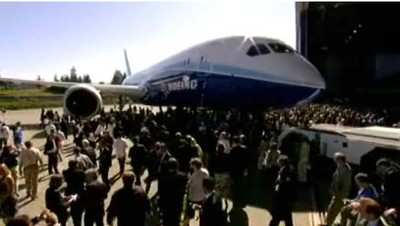Looking Past 787 Production Schedule Changes
 Boeing is blessed right
now with the perfect circumstances for doing business, according to
several financial analysts. Low interest rates and a hot global
economy are good for business, and with the exception of a credit
squeeze everything should be ideal for selling aircraft.
Boeing is blessed right
now with the perfect circumstances for doing business, according to
several financial analysts. Low interest rates and a hot global
economy are good for business, and with the exception of a credit
squeeze everything should be ideal for selling aircraft.
As for the competition, Boeing has only one significant rival...
one which appears hapless lately.
Airbus, a combination of businesses owned by European Aeronautic
Defense and Space, was sluggish delivering its A380 superjumbo jet
-- it can hold more than 800 passengers -- to customers, reports
The New York Times. Those issues were smoothed out, but Airbus has
been held back by other factors, together with spikes in costs.
That works to Boeing’s advantage, even the value of the
dollar to the euro.
Airbus troubles are apparent in the stock of EADS. It has
plummeted down roughly 20 percent over the last two years, despite
exchange rates the euro share would be worth roughly the same
number of dollars today.
Boeing stock has risen 35 percent in the same period, but was
higher until recently. Shares have seen a drop of 10 percent since
the company reported logistical problems of its own in October.
Various foreign suppliers of components for the 787, the
next-generation jet which Boeing is counting on for growth, have
not been able to meet deadlines, thus threatening the
company’s timetable for delivering the jet.
Boeing’s strategy is to condense production time once the
flow of parts from supplier’s increases. That would mean
delivering far fewer planes than promised next year or in 2009.
Boeing stock failed to recover from a dip last month suggesting
that investors have little confidence in the new delivery schedule.
The greatest of their concerns seem to be the plan calls for an
increase in production even before the aircraft obtains
certification.
The current plan could increase the risk of more delays and
greater expense if problems are discovered that require the 787 to
be reworked, said Joseph B. Nadol III, an analyst at JPMorgan.
Nadol rates the stock as neutral, a step up from the underweight
evaluation he had for much of the last two years.

The revised 787 plan raised eyebrows even among Boeing bulls.
Joseph P. Campbell, an analyst at Lehman Brothers, has an
overweight rating and a $112 price target on the stock, even as he
foresees $1 billion in added costs from the 787 glitches and
wonders how the new timetable can be met. Campbell remains a fan of
the stock because he regards the production stumbles as only a
temporary setback.
"We expect Boeing will have a very hard time staying both on
schedule and on budget for the 787, but both may still be
possible," he wrote in a research report. "Even so, we do not
expect Boeing’s 787 program will miss in ways that are so
important relative to the expected financial results that the share
price performance will be negatively affected for extended
periods."
Richard Tortoriello, an analyst for Standard & Poor’s
Equity Research, agrees. It may take a while getting into the air,
but the 787 will be a terrific plane, he said.
"It’s more fuel-efficient and cheaper for airlines, and it
seems to be the right size, too," Tortoriello said. "That’s
one reason Boeing is selling so many of them. It’s a midsize
plane that has a good range and can get into and out of a lot of
airports."

By focusing on the 787 and not the production delays, some
analysts speculate the Boeing stock will value at $118.
"I don’t see it as a huge problem," Tortoriello said of
the production trouble. "If they overcome it successfully, they
should have a great, profitable program going forward. I think the
stock price reflects a good dose of worry right now over the 787,
and that’s where I see opportunity."
 Aero-TV: DeltaHawks Diesel Power Steps Into the Spotlight
Aero-TV: DeltaHawks Diesel Power Steps Into the Spotlight NTSB Prelim: Mooney Aircraft Corp. M20K
NTSB Prelim: Mooney Aircraft Corp. M20K ANN FAQ: Turn On Post Notifications
ANN FAQ: Turn On Post Notifications ANN's Daily Aero-Linx (12.20.25)
ANN's Daily Aero-Linx (12.20.25) Aero-News: Quote of the Day (12.20.25)
Aero-News: Quote of the Day (12.20.25)





